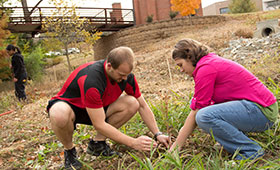
Lander University has received recognition as a "Tree Campus USA" for its commitment to incorporating tree plantings in its landscaping program. The designation by the national Arbor Day Foundation honors colleges and universities for promoting healthy trees, and engaging students and staff in the spirit of conservation.
Dr. DeWitt Stone, chair of Lander's Arboretum Committee, said of the award, "It shows that Lander cares about its leadership in environmental education matters and beautifying the campus." Stone said there are studies showing that when prospective students visit campuses, the attractiveness and beauty of the surroundings can make a difference in their decision to enroll.
Lander is one of only six institutions of higher education in South Carolina and fewer than 200 nationwide to be selected for the award. Arbor Day Foundation chief executive officer John Rosenow said in his letter of congratulations, "Your diligence in improving the environment and quality of life at Lander University contributes to a healthier planet for us all."
The university's Arboretum Committee, which was established 10 years ago, is composed of five Lander representatives and five from the community. Stone said the group focuses on beautifying the campus with plantings that have educational value for students and faculty. Some 40 to 50 mostly native trees are planted each year. Stone said, "We try to plant a variety of trees; young trees that will be replacements for older trees." The committee looks for a variety of plantings but availability from nurseries is a big factor in making choices. Stone added that, over the years, tree form camellias have become a Lander trademark.
University President Daniel Ball said Lander's tradition of existing in harmony with the environment will continue, thanks to the work of the Arboretum Committee. "Tree Campus USA designation is fitting testimony for that tradition, of which we are proud."
Stone said a permanent endowment created by a donor and contributions help the Arboretum Committee pay the cost of buying and planting trees. Workers in the university's grounds department provide assistance in addition to their routine landscaping responsibilities.
One of the Arbor Day Foundation's criteria for the award is the involvement of students in service learning projects such as tree planting. Earlier this year, members of Lander's Tri-Beta biology honor society planted 45 saplings on the banks of a stream running through a ravine on campus, where dead and dying trees and other vegetation had been removed to improve drainage.
Dr. Austin Trousdale, assistant professor of biology and Tri-Beta's adviser, said, "Having Lander students participate in the service project, particularly those majoring in the life or physical sciences, solidified our application for the award and helped improve the aesthetics and environmental integrity of our campus." He added that the students reinforced a shared sense of community, especially with regard to stewardship of air, water sources, soil and plant life.
To maintain its Tree Campus USA designation, Lander will be required to submit yearly documentation to the Arbor Day Foundation demonstrating that it is continuing to live up to the organization's standards for the award.
The foundation was created in 1972 and is the largest nonprofit conservation and education organization dedicated to planting trees.